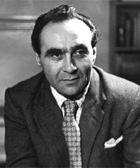
Insight

IN THE LATE NINETEEN-FIFTIES Bronowksi was beginning to feel he needed an academic base from which to work.
An application, in late 1956, to the Institute of Advanced Study had floundered. The director, Robert Oppenheimer had written back:
We have concluded that we should not invite you to come to the Institute at this time. I need to give you a word of explanation. As we understand what you have in mind for the near future, and we are guided in this by reading the Common Sense of Science and your more recent articles in the Nation, you will attempt to make available to the intellectual lay public some insight and some understanding of what the great progress and new knowledge in the sciences means [...] we view this undertaking with great sympathy [...] but it is not what the IAS is for. Our purpose is to assist in advanced study in the most literal and austere sense of these words.After a car accident in 1958, and a period of time abroad in convalescence, Bronowski was greatly exercised in wondering if he should spend time accepting a Rockefeller Foundation Fellowship that had been suggested by Warren Weaver, vice-President of the Foundation, but he had to accept that the Coal Board would not allow him more leave of absence. He wrote in November 1958 to Warren Weaver:
[...]these twelve months have convinced me that, as time goes on, my administrative duties make it more and more difficult for me to do original thinking and writing. I have therefore resolved to give up my post, and return to being a thinker.But it did not happen. An offer from the University of Pennsylvania in the fall of 1959, originally accepted, was later rejected when a new department of process development at the Coal Board was created and Bronowski made director-general. The family moved to London where the department was based to live at 1, The Hexagon, Highgate, N6.
There was return to television. In the early sixties he Bronowski wrote and presented a series (later a book) called Insight for BBC television, interviewing Abdus Salam, Eduardo Paolozzi and Laurence Durrell, among others. In it, he demonstrated the concepts of probability and entropy and the capacities of human intelligence. It was an ambitious series, a foreshadow of Ascent, though studio-based.
He also became involved in discussions with Jonas Salk on the creation of a new institute. Among those included in the same discussions was the biologist, Francis Crick
In the very early days 'Bruno' Bronowski and I would fly from London to Paris to consult with Jonas Salk, Jacques Monod, Mel Cohn and Ed Lennox on such fascinating topics as the by-laws for the proposed institute. [Ref. 8]
The resulting Salk Institute for Biological Studies was constructed at La Jolla, near San Diego, California, and concerned itself with the integration of the biological and human sciences. When the Salk Institute was officially completed, on December 1, 1960, Bronowski was initially a non-resident fellow there, but in 1964 he moved to more or less permanent residence at La Jolla as Senior Fellow and Director of the Council for Biology. He bought a 2.5 acre plot of land overlooking the Pacific Ocean and engaged the architect Russell Forester to produce a modernist house. He moved with his wife with their two youngest daughters into 9438 La Jolla Farms Rd in 1965.
Interviewed on the third programme by John Maddox in a series called Frankly Speaking, (7 January 1964) he explained that:
The intellectual has a very special status in England. He is thought rather comic but rather lovable. He is part of the landscape; you don't have to take him too seriously, but you listen to him with courtesy and attention. England's a country which has the greatest of charms for intellectuals like me: it's a country of Philistines who are enormously tolerant.
Ten years later in a radio broadcast, also with John Maddox, in a similar series, this time called Scientifically Speaking, he said:When I went out to California, ten years ago, I became deeply disturbed by the way in which psychologists, and people working on animal behaviour, transferred observations that they made on the robin redbreast, the duck or the rat, to human societies, and light-heartedly said: "Oh, robin redbreast defends his territory and therefore the stockbroker tries to corner the market" - and other cosmic remarks of that sort. I won't quote the authors, because that would be unkind, and besides, people might buy their books if I actually named them
It was work in his own named filed of human specificity - what makes human beings uniquely human? At the Institute he could, at last, pursue, full-time, the study of the biological inheritance of human beings and what made them unique.
His interest in the arts did not stop and he invited Philip Larkin to be poet-in-residence in 1968. Larkin refused.
From here he was invited to give many lectures, including The Identity of Man which appeared in book form in 1965. He also took sabbatical leave from 1969 to plan and film The Ascent of Man.
Enter Chapter 6 The Ascent of Man
James Watson - the co-discoverer of DNA here recollects when Bronowski was witness to his wedding.
Jonas Salk remembers his first meeting with Bronowski and the philosophy of the Salk Institute.

|
Copyright © 1997 by Stephen Moss. All rights reserved.